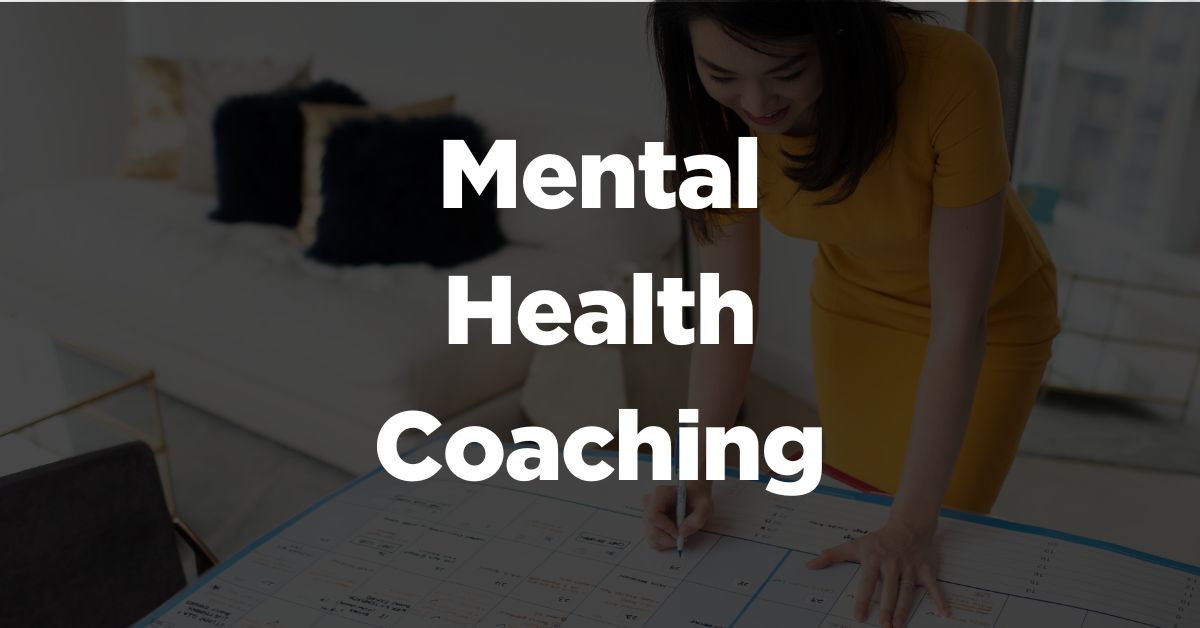What does a mental health coach do?
And what are the best certifications?
Today, you’ll learn…
- What mental health coaching is
- The best certifications
- How to become a mental health coach
And more.
Let’s jump right into it!
You’ll learn:
- What a mental health coach is
- Mental health coaching vs therapy
- What a mental health coach does
- How mental health coaches help their clients
- How to become a certified mental health coach
- The best mental health coach certifications
What is a mental health coach?
Want to become a mental health coach?
In short, a mental health coach is a professional who helps clients improve their mental well-being.
They help clients:
- See things from different perspectives
- Shift their mindsets
- Develop coping strategies
- Change their behavior
- Overcome obstacles
To make such transformative changes happen, there are some specific coaching strategies you would use.
You…
- Ask clients what they want to achieve and what’s stopping them
- Teach coping techniques for managing stress and emotions
- Help clients change behaviors that aren’t good for them
- Show how to keep up with new habits
- Build up your clients’ belief in themselves
Get the Ultimate Guide
for building a
6-Figure Coaching Business so you can achieve more freedom!
With your support and expert advice, your clients can change their lives for the better. You show them where they can improve, and how to achieve the transformation they’re after.
In fact, a study by Mayo Clinic shows that wellness coaching can impact several mental health-related areas, such as stress levels, depressive symptoms, and quality of life.
This directive approach sets you apart from therapists…
Difference between mental health coach and therapist
What’s the difference between a mental health coach and a therapist?
There are five important things that set them apart:
- Credentials: Therapists usually hold a master’s in psychology or a related field. They have also fulfilled supervised clinical hours. And to offer therapy, they need the correct licenses. Mental coaches are not bound to these strict rules. But in this line of work, a psychology education or similar is still very useful. (More on that in a bit…)
- Diagnose: Mental health coaches don’t diagnose mental illnesses. That’s the job of therapists and doctors. You also don’t specialize in treating complex problems, like major depression or generalized anxiety disorder. Instead, you help clients manage everyday worries or achieve specific personal goals.
- Medication: Therapists, especially psychiatrists, can prescribe meds. Coaches can’t. If a client is looking for medication for their mental health, then what you can do is refer them to a psychiatrist for that.
- Focus: Therapists often delve into past experiences to heal current issues. But mental health coaching focuses on improving your client’s present and future. You’re there to support, mentor, and guide, not to work through unresolved trauma from the past.
- Results: Because therapy tends to focus on deeper issues, it can be a long journey. Goals are usually not that clear-cut, and there’s often no fixed end date. Coaching is more like, “Let’s hit these goals by this time.” It’s about getting results within a specific timeframe. To make this happen, you create a clear coaching plan.
As a mental health coach, you fill a gap in mental health care. There’s a huge shortage of mental health care providers. And many therapists have extremely long waiting lists.
This means that people who are facing less severe issues are often put on hold.
And that’s where you can really make a difference.
You can help those who don’t need intense therapy, but who could still use some professional coaching.
Let’s explore what your role would be.
What does a mental health coach do?
Great mental health coaching helps clients build more fulfilling lives.
Here are some ways you could have a positive impact:
- Personal growth
- Handling stress
- Balancing work and life
- Discovering one’s purpose
- Strategies to tackle problems
- Lighter mental health issues
However, coaches don’t directly work with severe mental health disorders like post traumatic stress disorder, depression, or big traumas. Then, you might refer them to a therapist or psychiatrist.
Instead, you coach and help clients navigate their everyday challenges.
For example, if a client feels anxious before meetings, you could teach them relaxation techniques to calm their mind. This support has a positive impact on their mental health, even if you don’t diagnose conditions like anxiety disorders.
In this video, I tell you more about what exactly coaching is:
Next, let’s go over who could use a mental health coach.
Is a mental health coach right for you?
Mental health coaches are not for severe mental health issues. But they’re perfect for guidance in situations where mental health support is needed, but not by a mental health professional.
Think of:
- Big life changes
- Stress management
- Mild anxiety
- Indecisiveness
- Feeling lost or stuck
- Trouble with friends or family
- Getting over a breakup
- Perfectionism
- Burnout
- Dealing with intense emotions
If you’re looking for targeted help, working with a mental health coach can lead to true transformation. That’s because they focus on practical, immediate strategies.
Some situations where the help of a mental health coach is particularly useful include situations where you…
- Are looking for a goal-focused way to improve your mental well-being
- Want to change your negative thought patterns or bad habits
- Are trying to discover your passion and purpose in life
- Need some help figuring out what you really want
- Want to stay on track and need a professional to hold you accountable
- Are going through a difficult time, like losing a job or dealing with a breakup
- Want to be proactive by taking care of your mental health before problems start
- Have problems that seem situational or temporary, like too much stress, feeling burned out, or not being able to decide
- Feel stuck or unsure about life changes
- Want to learn how to handle tough feelings like anger and sadness
- Are looking for real, doable steps to handle your life better
Because the options are so broad, almost anyone can benefit from mental health coaching.
But how do you become a mental health coach? That’s what we’ll cover next.
How to become a certified mental health coach
There are four important steps to becoming a certified mental health coach:
- Find your mental health coaching niche: Picking a niche makes your coaching targeted. This way, your clients get better results AND you stand out more. Think about what and who you want to focus on. You can also work on common problems or goals like feeling unsure or wanting to handle emotions better.
- Create a mental health coaching program: Work with packages instead of hourly rates. Start with a three-month program that includes regular calls and support for $1,500. This puts the focus on the results your clients will achieve, instead of how many hours you put in.
- Get your mental health coach certification: Pick a certification program that fits your interests and finish it. This can take anywhere from a few weeks to several months.
- Get your first paying client: Use your community and social media to connect with potential clients. Then begin your coaching journey with ONE client and give them a transformative experience.
To be a certified mental health coach, you need a certification.
But that doesn’t mean that you can’t coach clients without one.
In fact, I always teach my students that real-life coaching experience is much more important than being certified. That’s because what matters most is what you help your clients achieve.
This isn’t any different with mental health coaching.
There are typically no official requirements, although it can be different for some specific niches.
However, you need experience – a system for helping people get results.
This could be:
- A degree in psychology or social work
- Relevant work experience
- Volunteering work
But if you want a mental health coaching certification, go for it.
Now, onto exploring the top mental health coach certifications.
The best mental health coach certifications
Thinking of becoming a certified mental health coach?
Then you’ll want to pick the right program.
Let’s go over what you need to pay attention to and what the best options are.
How to choose a mental health coach certification program
Not sure which mental health coach training is best for you?
Get the Ultimate Guide
for building a
6-Figure Coaching Business so you can achieve more freedom!
Here’s what to look out for when picking a mental health coach program:
- Accreditation: Make sure the program is recognized by reputable organizations. This makes it more likely that it’ll be worth your time. The International Coaching Federation (ICF) is the highest standard in coaching. Other institutions, such as the National Board for Certified Counselors (NBCC), are also good options.
- Program cost: Programs vary widely in price. Decide which one fits your budget while also offering you value.
- Course length: Think about how much time you can dedicate. Programs range from a few weeks to several months. Some are also much more intense than others.
- Flexibility and learning mode: Can you attend in person or do you prefer an online course? If you’re very busy then a program that lets you study at your own pace might be best.
The best mental health coach certifications
With so many options out there, it can be hard to make a decision.
Here’s an overview of some of the best mental health coaching certifications:
- iNLP Center – Mental Health Coach Certification Training: The iNLP Center is a globally recognized training center for life coaching and neuro-linguistic programming (NLP). They offer an ICF-accredited program that combines psychology, NLP, and life coaching skills. It’s a 10-week course with live classes, partner homework, and studying on your own. It’s all online and also lets you go at your own speed. (Price: $7,500)
- Headspace – Mental Health Coaching Program: Headspace is known for its meditation and mindfulness app, but it also offers a mental health coaching program. The course is approved by the National Board for Health & Wellness Coaching (NBHWC). The detailed program dives deep into mental health coaching. It includes immerse training activities as well as 20 live online classes. You’ll need to attend weekly classes for six months. (Price: $5,995)
- Quality Mind – Mental Health Certification Training: Quality Mind’s program brings together the latest neuroscience, positive psychology, NLP, and ancient philosophies. The program is accredited by the ICF. You can choose from three different options: a fast ten-week track, a three-month one, or a year-long one. (Price: depends on the length of the program)
- Light University – School of Mental Health Coaching: This program is unique on this list in that it blends Christian ideas with mental health coaching. It has three on-demand courses you can take whenever you want. These courses cover everything from basic coaching skills to handling tough situations. Some topics that will be discussed are faith and spirituality, crisis intervention, suicide intervention, mental illness, and so on. (Price: $2,400, but they offer full scholarships)
You now know how to become a (certified) mental health coach.
But is there also a demand for this type of coaching?
Let’s take a closer look…
Overview of the mental health coaching industry
Long waiting lists for psychologists show there’s demand for mental health services. But you can also tell by looking at the industry’s growth.
In 2019, the global market for mental wellness was measured for the first time and valued at $130 billion.
It then grew a lot during the pandemic and hit $181 billion by 2022. The US is the biggest market ($87 billion), followed by China and Canada.
Now, what about your earning potential?
According to Salary.com, US mental health coaches make $46,393 on average.
While Glassdoor says that the average mental health coach salary is $54,524, with a range of around $44k – $68k.
Can you earn more?
Absolutely!
When you’re your own boss, what you charge is up to you.
Mental health coaching has a big impact. You help clients improve their lives and make necessary changes.
This transformation is incredibly valuable. And many people are willing to pay for it.
Get the Ultimate Guide
for building a
6-Figure Coaching Business so you can achieve more freedom!
In fact, many of my clients in various coaching niches make six or multiple six figures and beyond each year. Ultimately, building a business that is both profitable and fulfilling sets you up for abundance, flexibility, and freedom.
Next steps
There you go! A complete guide to mental health coaching certifications.
The success of your mental health coaching business depends on the results you help your clients get. Ready to begin applying what you’ve just learned?
Then grab my blueprint for a six-figure coaching business today. It teaches you exactly how to transform your skills into a rewarding business.

Want to Build a 6-Figure Coaching Business So You Can Achieve More Freedom?
When you sign up, you’ll also receive regular updates on building a successful online business.
Read more:
The Best Coaching Certification Programs
How to Become a Wellness Coach








